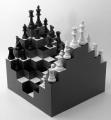The arrival of al-Qaida
Initially, looters at Qa'qaa had targeted consumer goods such as fridges and air-conditioners. Although munitions had been taken, no one really knew what to do with them. It soon dawned, however, that they might be intrinsically valuable. Weaponry was rapidly emerging as a second currency.
"After the invasion, we started seeing these Arabs, these foreign fighters," recalls Haki, "Palestinians, Egyptians, Libyans." Most Yusifiyans were wary of these new arrivals, but a number of local tribes took them in: "Karagol, Jenabies, Rowissat . . ."
Yusuf, an emerging leader in the insurgency who belongs to one of these tribes, confirms the story. "We allowed the Arabs into our houses and our farms. We welcomed them properly. Some of them even married our daughters." The fact they were Arab strangers was sufficient to ensure hospitality, but these foreigners had extra pull. They were fedayeen. They were al-Qaida.
They also informed the tribes that some of Qa'qaa's contents were considerably more valuable than rocket launchers and pistols. It wasn't long before Yusuf finally stumbled upon Qa'qaa's real treasure. "We found something that we didn't recognise. It was like a powder. It was stored in specific conditions, in special barrels." Yusuf had no idea what it was, but he thought he might as well take some. Only later would he learn that it was pure, crystalline high explosive.
Following the rush to appropriate munitions, Yusifiyans had to figure out where to store their loot. Many hid it in their homes. This soon led to tragedy. Rival groups fired rocket-propelled grenades into each other's houses, knowing they were full of explosives. Accidents also led to fatalities. One of Yusuf's barns blew up.







Bookmarks